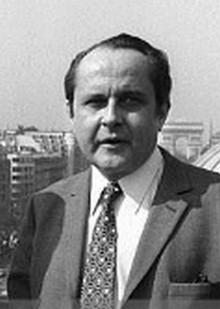Paul Sérant
| Paul Sérant | |
|---|---|

Paul Sérant on 20 March 1972
|
|
| Born |
19 March 1922 Paris, France |
| Died | 2 October 2002 (aged 80) Avranches, Manche, France |
| Nationality | French |
| Occupation | Journalist and writer |
Paul Sérant is the pen name of Paul Salleron (19 March 1922 – 2 October 2002), a French journalist and writer. He was the brother of the Catholic theoretician Louis Salleron. He was a great lover of the French language, but was also a lover of regional diversity, and supported preservation of local cultures such as Breton, Occitan and Basque. His vision for Europe was one in which the nation states would dissolve, leaving a federation of ethnic groups.
Paul Salleron was born on 10 March 1922 in Paris. He was one of nine children, the younger brother of the Catholic journalist and theorist Louis Salleron. He was educated by priests. During the occupation of France in World War II (1939-45} he was a member of the Resistance. He then joined the BBC foreign service. He adopted the pen name of Paul Sérant.
The journal Accent grave (revue de l'Occident) was launched in 1963 and ran to less than a dozen issues. It included Paul Sérant, Pierre Andreu, Michel Déon, Roland Laudenbach and Philippe Héduy on its board. The journal followed the ideas of Charles Maurras and had the theme of the crisis of western civilization. Paul Sérant won three awards from the Académie française:
Paul Sérant died on 2 October 2002 in Avranches, Manche.
Paul Sérant was not part of the literary world, and was not well known to the public, but wrote prolifically. He published novels that reflected his personal experiences in the post-war period, and was interested in the mystical and esoteric writings of George Gurdjieff. At first he was interested in the ideas of traditionalist thinkers such as René Guénon. Later he devoted himself to the study of ideologies, the crisis of civilization and regionalism. Paul Sérant was a penetrating and independent thinker who always challenged othodox opinions of both the left and the right. He wrote of the intellectuals who had collaborated with the German occupiers, and of Portugal under the dictatorship of Salazar. In the early 1970s he engaged in a vigorous debate with the great journalist Louis Pauwels, whom he considered to optimisitic, too right-wing and too western.
...
Wikipedia
